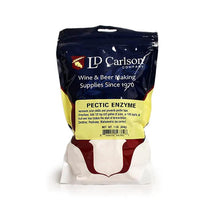Pectic enzymes are a group of enzymes that are commonly used in winemaking to improve the quality and clarity of wine. These enzymes are naturally occurring enzymes that break down pectin, a complex carbohydrate found in the cell walls of plants, including grapes.
During the winemaking process, pectin can be released from the grapes, causing the wine to become cloudy and hazy. Pectic enzymes break down the pectin into smaller molecules that can then be easily removed from the wine, resulting in a clearer and brighter wine. Additionally, pectic enzymes can help to improve the extraction of color and flavor compounds from the grape skins, resulting in a wine with better aroma, flavor, and color.
Pectic enzymes are typically added to the grape must (the crushed grapes and juice) during the maceration period, which is the time when the grape skins are left in contact with the juice. The enzymes break down the pectin in the skins, allowing the juice to extract more color, flavor, and aroma compounds. After maceration, the must is pressed, and the enzyme-treated juice is fermented to produce wine.




